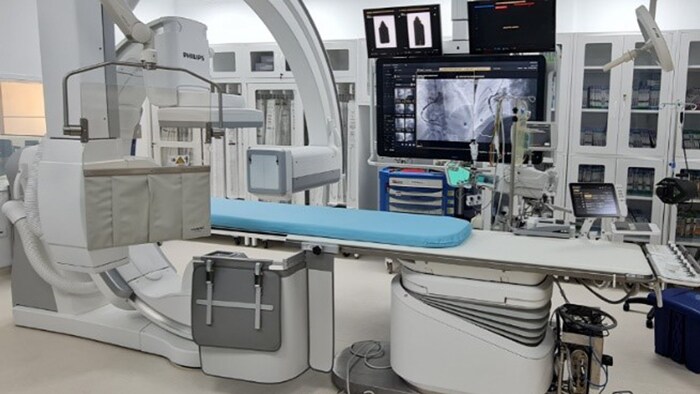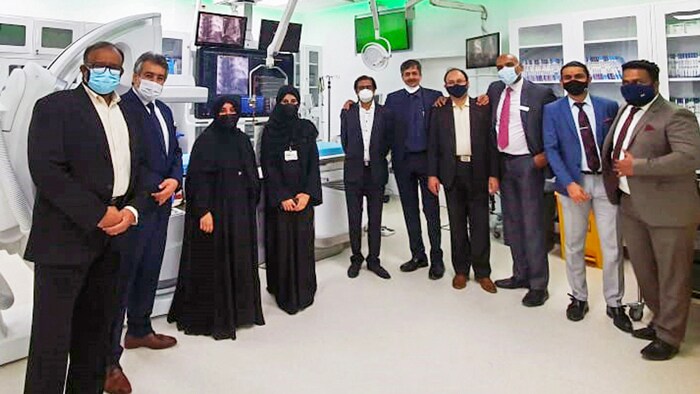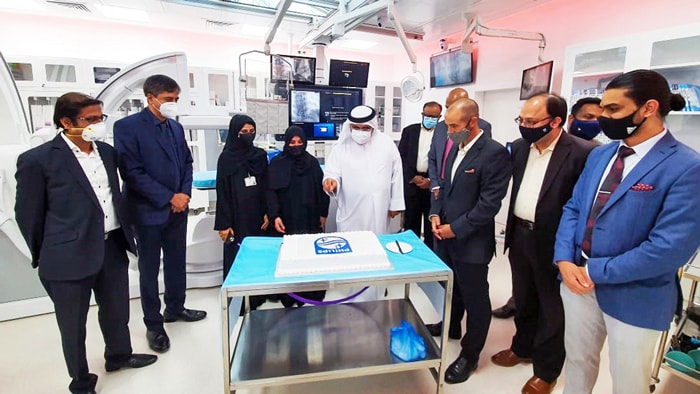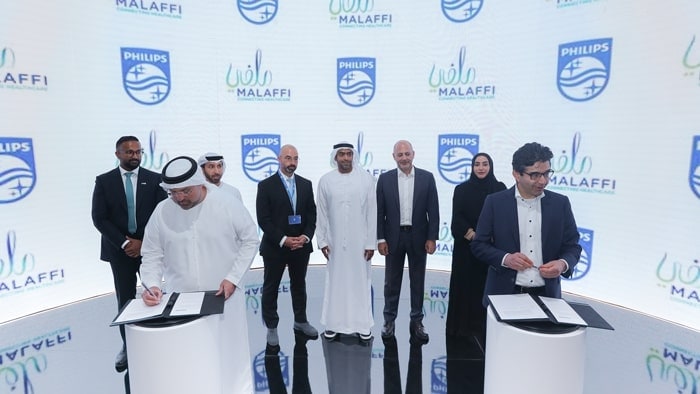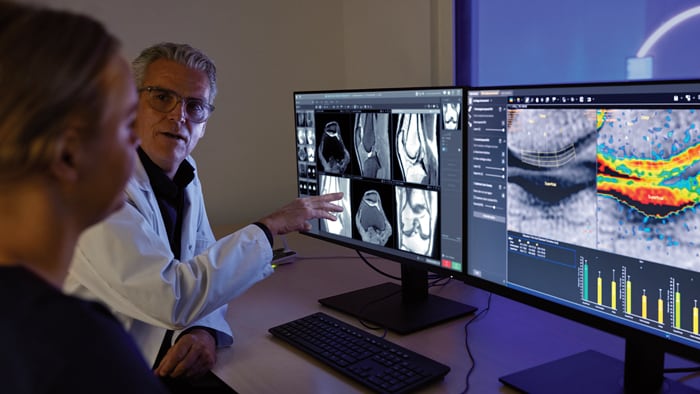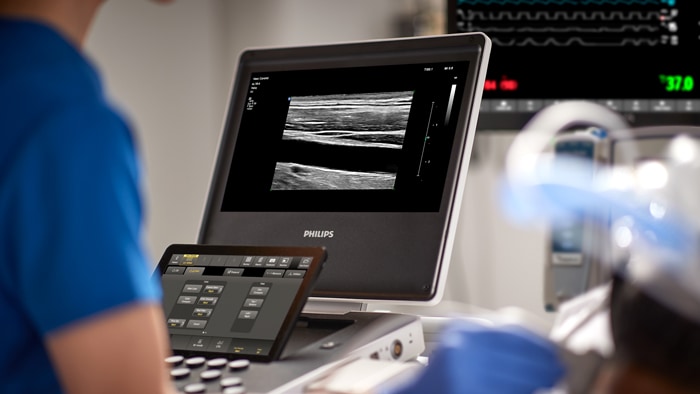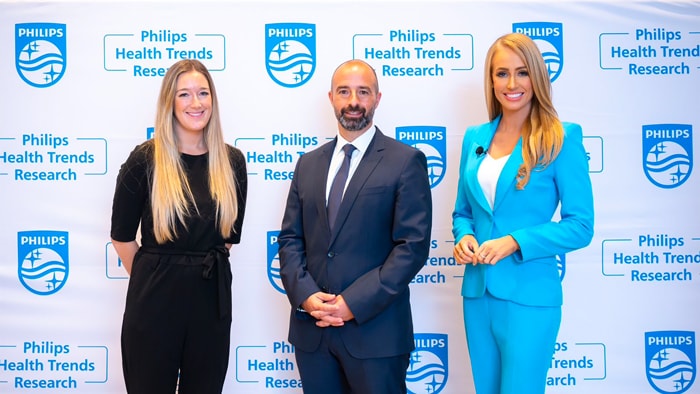May 23, 2021
Philips partners with MOHAP, Al Qassimi Hospital in Sharjah to support better clinical outcomes with installation of new technology
Dubai, United Arab Emirates – Philips, a global leader in health technology, has partnered with Al Qassimi Hospital, the largest MOHAP hospital in Sharjah and leading healthcare provider in cardiology, electrophysiology and neurovascular treatment, to enhance patient and staff experience with the installation of the new Azurion 7 B20/12 Biplane image-guided therapy system and iApps. With the help of this partnership, Philips continues to strengthen its long-term relationship with MOHAP, and Al Qassimi Hospital by supporting the quadruple aim: better health outcomes, lower cost of care, and improved patient and staff experience.
Importance of Azurion Biplane system and iApps This industry leading image-guided therapy platform allows staff to perform procedures easily and confidently with a unique user experience, helping optimize lab performance and providing superior care. Allowing seamless control of all relevant applications from a single touch screen at table side, to help make fast, informed decisions in the sterile field. By acquiring this unique technology and iApps in the Azurion biplane system, Al Qassimi hospital has upgraded their cath setting to enhance patient care and help expand their clinical services and outcomes. According to an independently verified study at St. Antonius Hospital in The Netherlands, Philips Azurion enabled a 17% reduction in procedure times, a 12% reduction of in-lab patient preparation time, and a 28% reduction of post procedure lab time, allowing them to treat 1 more patient per day 1 Additionally, the Philips ClarityIQ is an X-ray imaging technology which provides high definition imagine quality at significantly lower dose across clinical areas, patients, and operators in comparison to the Allura Xper system. In diagnostic coronary angiography, ClarityIQ technology reduces patient dose up to 75% while maintaining diagnostic image quality, compared to an Allura Xper system 2 a,b, and in EP procedures, ClarityIQ technology reduced patient dose up to 43%, compared to an Allura Xper system 3 a,c . While in diagnostic and interventional neuro procedures, ClarityIQ technology reduces patient dose up to 62% and 65%, respectively, compared to an Allura Xper system 4 a,d. With that being said, the Azurion X-ray system with ClarityIQ technology provides a new standard of image quality, by pushing the boundaries of ALARA (As Low As Reasonably Achievable) imaging.
“Our strategic partnership with MOHAP, and Al Qassimi hospital reinforces our purpose to continue to improve people’s health and well-being through meaningful innovation, as we look forward to seeing staff optimize lab performance and provide superior care to every patient. We see healthcare as a connected whole, from patient satisfaction, seamless staff experience and precise technology. We look forward to continue strengthening our partnership with MOHAP and strive for operational excellence.”
Manoj Arora
Business Leader, Images Guided Therapy Philips META
“Al Qassimi hospital aims to improve the quality of cardiology and prevent cardiovascular diseases in the long run. Philips’ partnership with MOHAP allows us access to unique technology that will enhance the cath setting, and provide our staff with the ability to make fast and informed decisions on ground by controlling all relevant applications from a single touch screen at the table side, allowing us to cater to more patients per day while improving patient outcomes”
Dr Arif Al Nooryani
CEO & Head of Cardiac Centre, Al Qassimi Hospital, Sharjah
References: 1. Whitepaper, results are specific to the institution where they are obtained and may not reflect the results achievable at other institutions 2. Eloot L, et al. Novel X-ray imaging technology enables significant patient dose reduction in interventional cardiology while maintaining diagnostic image quality. Catheter Cardiovasc Interv. 2015 Nov;86(5): E205-12 3. Dekker LR, et al. New image processing and noise reduction technology allows reduction of radiation exposure in complex electrophysiologic interventions while maintaining optimal image quality: a randomized clinical trial. Heart Rhythm. 2013 Nov;10(11):1678-82. 4. Söderman M, et al. Radiation dose in neuroangiography using image noise reduction technology: a population study based on 614 patients. Neuroradiology. 2013 Nov;55(11):1365-72. a) The results of the application of dose reduction techniques will vary depending on the clinical task, patient size, anatomical location and clinical practice. The interventional radiologist assisted by a physicist as necessary has to determine the appropriate settings for each specific clinical task. b) Results based on total dose area product from a single center, prospectively randomized cohort study on 70 consecutive patients (35 for Allura Xper without ClarityIQ and 35 for Allura Xper with ClarityIQ). Number of cine images and contrast medium did not significantly differ between the two cohorts, while fluoroscopy time was significantly higher for the ClarityIQ group. Image quality was based on subjective assessment of two cine runs selected from each patient in two specific projections. Ratings for image contrast, resolution and general appearance were not statistically different. Image noise was more apparent for ClarityIQ images. c) Results based on total dose area product from a single center prospectively randomized cohort study on 136 patients (68 for Allura Xper without ClarityIQ and 68 for Allura Xper with ClarityIQ). Procedural performances (fluoroscopy time and number of cine images) of the physicians did not significantly differ between the two cohorts. e) Results based on total dose area product from a single center retrospective, historically controlled cohort study on 614 patients (302 for Allura Xper without ClarityIQ and 312 for Allura Xper with ClarityIQ). Procedural performance (fluoroscopy time and number of DSA images) of the physicians did not significantly differ between the two cohorts.
About Royal Philips
Royal Philips (NYSE: PHG, AEX: PHIA) is a leading health technology company focused on improving people's health and well-being, and enabling better outcomes across the health continuum – from healthy living and prevention, to diagnosis, treatment and home care. Philips leverages advanced technology and deep clinical and consumer insights to deliver integrated solutions. Headquartered in the Netherlands, the company is a leader in diagnostic imaging, image-guided therapy, patient monitoring and health informatics, as well as in consumer health and home care. Philips generated 2020 sales of EUR 17.3 billion and employs approximately 77,000 employees with sales and services in more than 100 countries. News about Philips can be found at www.philips.com/newscenter.
About Al Qassimi Hospital
Al Qassimi Hospital is one of the largest government hospitals in Sharjah UAE. The Joint Commission International (JCI) accredits the hospital for its adherence to international standards for medical institutions. Al Qassimi Hospital is a MOHAP-run hospital, providing efficient healthcare services across multiple disciplines and specializations. Some of the facilities at the hospital include outpatient clinics, operating rooms, pediatrics, cardiovascular department, and physiotherapy.

